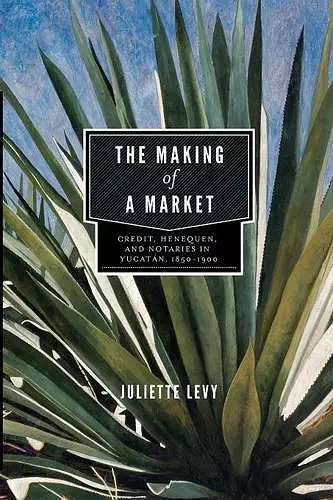The Making of a Market
Credit, Henequen, and Notaries in Yucatán, 1850–1900
Format:Paperback
Publisher:Pennsylvania State University Press
Published:15th Mar '12
Currently unavailable, and unfortunately no date known when it will be back
This paperback is available in another edition too:
- Hardback£60.95(9780271052137)

During the nineteenth century, Yucatán moved effectively from its colonial past into modernity, transforming from a cattle-ranching and subsistence-farming economy to a booming export-oriented agricultural economy. Yucatán and its economy grew in response to increasing demand from the United States for henequen, the local cordage fiber. This henequen boom has often been seen as another regional and historical example of overdependence on foreign markets and extortionary local elites. In The Making of a Market, Juliette Levy argues instead that local social and economic dynamics are the root of the region’s development. She shows how credit markets contributed to the boom before banks (and bank crises) existed and how people borrowed before the creation of institutions designed specifically to lend. As the intermediaries in this lending process, notaries became unwitting catalysts of Yucatán’s capitalist transformation. By focusing attention on the notaries’ role in structuring the mortgage market rather than on formal institutions such as banks, this study challenges the easy compartmentalization of local and global relationships and of economic and social relationships.
“The Making of a Market is a work with high intellectual standards and is written in engaging and pleasant prose. It offers a relevant contribution to the social sciences, especially in regard to the social nature of credit markets. Juliette Levy illustrates, with concrete examples, how social interactions and economic decisions articulate the early formation of a financial system.”
—Gustavo Del Angel, Centro de Investigación y Docencia Económicas, A.C.
“How does an economy finance long-term investment before the existence of banks? Most scholarship on finance and economic development would argue that such a feat was difficult if not impossible, at least not on a meaningful scale. Juliette Levy’s fine book turns that received wisdom on its head by demonstrating that the Yucatán’s henequen boom at the turn of the twentieth century—one of the major commodity booms of its time—managed to mobilize substantial financial resources without such formal financial intermediaries. This outstanding work of economic history convincingly argues that personal credit filled the gap, channeling money from savers to borrowers through their shared connections with notaries. In Levy’s analysis, notaries come to life in their role as agents of change. Through detailed study of their interactions with the men and women of the Yucatán, as recorded in their ledgers, they become tangible, three dimensional, and personal. Like Margaret Chowning’s fine work on Michoacán, this book offers a compelling argument for detailed archival research into personal wealth and its role in transforming Mexico.”
—Anne Hanley, Northern Illinois University
“This is a thoughtful econometric analysis of the development of credit markets in late nineteenth-century Yucatán, Mexico. Juliette Levy's argument is at once straightforward and innovative. Levy is certainly not the first scholar to make use of Yucatán's rich notarial archives, but no one has made better or more systematic use of this type of documentation.”
—Allen Wells, Bowdoin College
“Juliette Levy's study of informal credit networks before the rise of formal financial institutions and their role in the development of Yucatán's commercial agriculture makes an important contribution not only to Mexico's economic history but also to the understanding of the role of traditional personal finance in other premodern economies, such as the Ottoman Empire and the Middle East. In addition, the book successfully integrates hard economic analysis based on rigorous research in the archives with socio-legal history, highlighting the role of women and notaries in a web of interpersonal financial transactions. As such, this book makes a unique contribution to economic and social history on a global scale.”
—Fariba Zarinebaf, University of California, Riverside, author of Crime and Punishment in Istanbul, 1700–1800
ISBN: 9780271052144
Dimensions: 229mm x 152mm x 12mm
Weight: 272g
176 pages